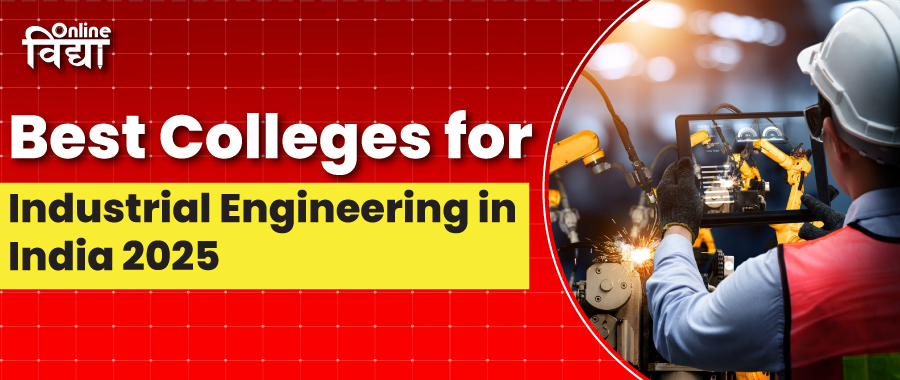Specializations
Courses Available
Courses

Best Colleges for Industrial Engineering in India 2025
Best Colleges for Industrial Engineering in India 2025,May 01, 2025
Information
May 01, 2025
1441 Views
- Share:
Industrial and systems engineering targets the development, creation, and installation of integrated systems of people, materials, information, equipment, and energy. It applies the techniques and methods of engineering analysis and design and the specific knowledge and skills of the mathematical, physical, and social sciences to establish, predict, and measure the results that such systems will generate. You will have choices if you hold an industrial engineering degree. Other engineering disciplines apply their expertise in highly specialized areas. Professionals can practice in a variety of industries due to Industrial Engineering. The advantage of both worlds is offered by industrial engineering, which integrates business and engineering studies.
Benefits Of Studying Industrial Engineering
The advantages of establishing a company with industrial engineering are as follows:
1. Industrial Engineering for Process Optimization
Industrial engineers have trained professionals to analyze and improve business processes. Their work assesses bottlenecks, optimizes processes, and eliminates waste.
Industrial engineers can reduce waste and maximize productivity through various techniques such as value stream mapping, time study, and process mapping.
2. Grow productivity and efficiency
Industrial technology helps increase productivity and efficiency in any company. Industrial engineers implement lean production techniques, including streamlining production processes, reducing lead time, increasing general efficiency, batch-on-time goods, and methods of continuous improvement.
They also worry about ergonomics and working design. Therefore, employees get the right environment to work, which reduces fatigue.
3. Establishment of quality control systems
The quality management brand ensures equity and customer inventory. The Industrial Engineer is the main character involved in establishing a sound quality control system, which is necessary for the quality assurance of products or services.
In its work, high standards are maintained in production by complying with industry standards, as these engineers practiced the term statistically based corrective measures.
4. Reduction in cost to maximum profit
One of the basic dimensions that increases a business's stability is to reduce costs. Through cost analysis units, industrial engineering experts identify waste areas, cut operating costs, and optimize supply chain processes.
To continue in the position of profitable business, companies must start plans to reduce costs, with which they can achieve competitive management.
5. Promote safety in the workplace
To ensure the maximization of companies while protecting the health of all employees, it becomes mandatory to provide a healthy environment for the workers. During their work, industrial engineers must implement safety management systems and risk assessments to reduce any risk of physical damage in the workplace.
India’s Top 20 Colleges for Mechanical Engineering
Name of the Institution | Score | Ranking |
Indian Institute of Technology, Madras | 89.46 | 1 |
Indian Institute of Technology, Delhi | 86.66 | 2 |
Indian Institute of Technology, Bombay | 83.09 | 3 |
Indian Institute of Technology, Kanpur | 82.79 | 4 |
Indian Institute of Technology, Kharagpur | 76.88 | 5 |
Indian Institute of Technology, Roorkee | 76.00 | 6 |
Indian Institute of Technology, Guwahati | 71.86 | 7 |
Indian Institute of Technology, Hyderabad | 71.55 | 8 |
National Institute of Technology, Tiruchirappalli | 66.88 | 9 |
Indian Institute of Technology, Banaras Hindu University, Varanasi | 66.69 | 10 |
Vellore Institute of Technology | 66.22 | 11 |
Jadavpur University | 65.62 | 12 |
S.R.M. Institute of Science and Technology | 65.41 | 13 |
Anna University | 65.34 | 14 |
Indian Institute of Technology (Indian School of Mines) Dhanbad | 64.83 | 15 |
Indian Institute of Technology, Indore | 64.72 | 16 |
National Institute of Technology Karnataka, Surathkal | 64.27 | 17 |
Indian Institute of Technology, Gandhinagar | 63.42 | 18 |
National Institute of Technology, Rourkela | 63.38 | 19 |
Birla Institute of Technology and Science, Pilani | 63.04 | 20 |
The Last Word
There are many advantages of applying industrial engineering concepts in setting up a business. Industrial engineering gives the tools and insights necessary to pave the way for long-term success through optimization of resources, minimizing wastage, increasing productivity, reducing costs, and ensuring employee safety.
While industrial engineering does have some disadvantages, much of its strength is in the fact that it seeks to systematize processes and enhance productivity. Other enormous disadvantages include the coordination of very large and complicated systems and layoff risks.
The incorporation of industrial engineering practices into the business strategy allows an entrepreneur to set foundations for future growth, profitability, and an asset named customer satisfaction.
FAQs
1. In what ways can productivity be increased with the aid of industrial engineering?
By eliminating waste, optimizing process flow, and creating work systems that foster motivated behavior, industrial engineering enhances productivity through methods like process optimization, lean manufacturing, and work design.
2. Which activities undertaken by industrial engineers help in cost reduction?
Industrial engineers examine operating costs and cost trade-offs to reduce costs and increase profitability; they optimize supply chain management and manage waste.
3. In what aspects can industrial engineering work help make the company's environment more durable?
Industrial engineers analyze energy consumption, waste management, and permanent supply chains to reduce environmental footprints, meet regulatory requirements, and develop a positive brand image.
4. Is there a demand for industrial engineers?
Yes, the industrial technique is now more in demand than ever before, because there is a lot of need to design, check, and improve workplaces; Design and implement effective production operations systems; collect data; And adapt procedures.

Meet Our Counselling Experts
Get 100% Free Career Counseling




PlacementPartners










Schedule Your 30 min Couselling Session With Today!!
Select a Date of your choice :
You Have Selected Slot on .

